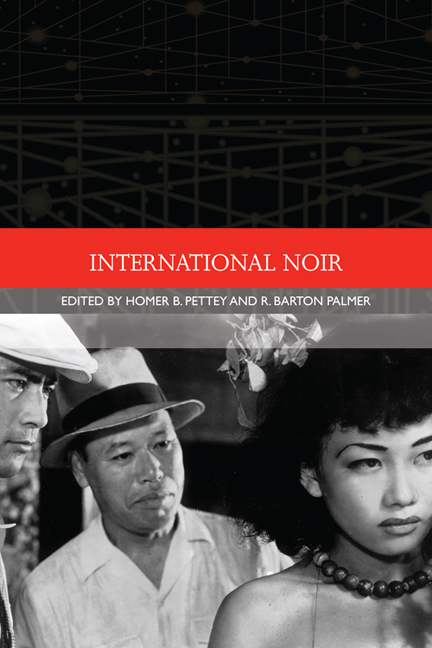Book contents
- Frontmatter
- Contents
- List of Illustrations
- Acknowledgements
- Notes on the Contributors
- Traditions in World Cinema
- Introduction: The Noir Impulse
- 1 British Noir
- 2 French Noir 1947–79: From Grunge-noir to Noir-hilism
- 3 French Neo-noir: An Aesthetic for the Policier
- 4 Early Japanese Noir
- 5 The Gunman and the Gun: Japanese Film Noir since the Late 1950s
- 6 Darker than Dark: Film Noir in its Asian Contexts
- 7 Nordic Noir and Neo-noir: The Human Criminal
- 8 Indian Film Noir
- 9 The New Sincerity of Neo-noir
- 10 Post-noir: Getting Back to Business
- Selected Bibliography of International Film Noir
- Selected Filmography of International Film Noir
- Index
3 - French Neo-noir: An Aesthetic for the Policier
Published online by Cambridge University Press: 05 August 2016
- Frontmatter
- Contents
- List of Illustrations
- Acknowledgements
- Notes on the Contributors
- Traditions in World Cinema
- Introduction: The Noir Impulse
- 1 British Noir
- 2 French Noir 1947–79: From Grunge-noir to Noir-hilism
- 3 French Neo-noir: An Aesthetic for the Policier
- 4 Early Japanese Noir
- 5 The Gunman and the Gun: Japanese Film Noir since the Late 1950s
- 6 Darker than Dark: Film Noir in its Asian Contexts
- 7 Nordic Noir and Neo-noir: The Human Criminal
- 8 Indian Film Noir
- 9 The New Sincerity of Neo-noir
- 10 Post-noir: Getting Back to Business
- Selected Bibliography of International Film Noir
- Selected Filmography of International Film Noir
- Index
Summary
Is there such a genre as French neo-noir? Do elements inherent in a group of films determine genre, or rather is it critical recognition that demonstrates how films might correspond to each other to form a set? Is genre a naming of filmic commonality, or a partial reading? In truth, a bit of both. This doubleness of the historical emergence of genres will be crucial to our investigation of French neo-noir, for it is hard to demarcate neo-noir as a historical successor to French classical film noir, as those lines blur. Yet, beginning with Jean-Pierre Melville's films, the French policier and gangster genres turn to a self-conscious reworking of US film noir; this self-conscious reworking serves as our very definition of neo-noir. As such, Melville's films might be read as neo-noir productively, even though they were made quite early, before the term ‘neo-noir’ had currency.
Yet, complicating this, all of the films we might think of as French film noir, let alone French neo-noir, might easily be seen as permutations of other genres: most notably what the French term the film policier or the polar, terms that correspond to an American notion of the police procedural, on one hand, and of the gangster film on the other. As the police procedural was one of the threads of film noir in the US, it is easy to see how film noir might be a category applied to these films; yet, those police films without noir stylisation would not merit the noir etiquette, and many French, as well as US, cop or gangster films have little or none. Also the two genres, gangster and police procedural, may overlap, while a subset of the gangster film, the heist film, is sometimes distinctly named as a genre. In addition, the thriller (including its psychological subset), the spy film, the black comedy and the mystery story are other genres with clear overlaps with what many call French film noir, classical or neo. I prefer a more restrictive definition: if there is no noir stylisation, the film will not be considered here as neo-noir.
- Type
- Chapter
- Information
- International Noir , pp. 61 - 84Publisher: Edinburgh University PressPrint publication year: 2014



